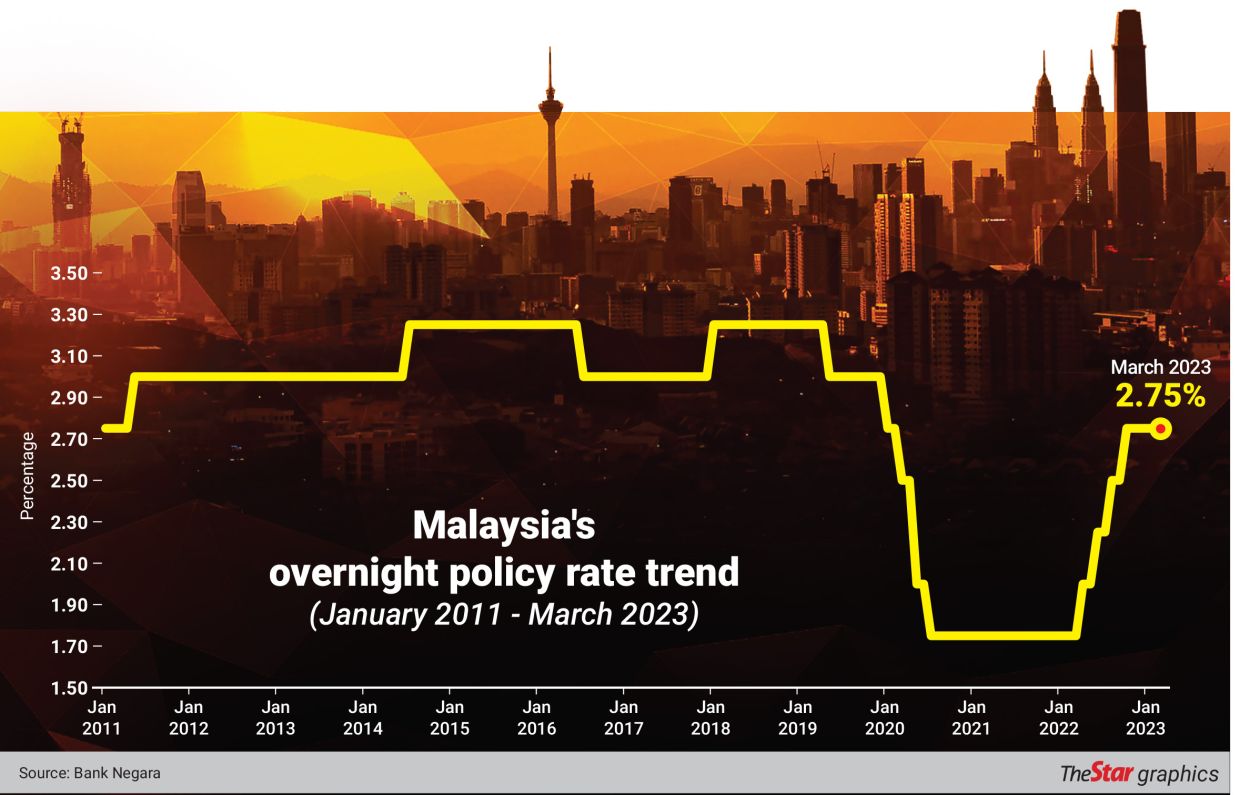Malaysia: OPR remains at 2.75%
PETALING JAYA: Economists have welcomed Bank Negara’s move to keep the country’s benchmark interest rate unchanged for the second time this year.
With the economy expected to slow down in the coming quarters amid elevated price pressures, the central bank’s decision to retain the overnight policy rate (OPR) at 2.75% may provide breathing space for households and businesses.
In a poll by Reuters, 16 out of 26 economists had predicted that Bank Negara would maintain the OPR at a meeting of its monetary policy committee yesterday.
A total of 10 economists, however, had forecast a rise of 25 basis points.
Malaysia University of Science and Technology economics professor Geoffrey Williams said the unchanged OPR shows Bank Negara’s confidence in the renewed stability of the economy.
The economy is forecast to grow at a sustainable rate close to average trend, supported by a strong financial sector, according to Williams.
Budget 2023 will also support growth against external risks, he said.
Williams also pointed out that inflation would continue to slow in the coming months.
“Producer and input prices are falling and oil prices, which are a key driver of costs, are much lower than they were this time last year.
“The annual change in oil prices is likely to be negative for the rest of the year. So the inflation outlook is better now.
“Inflation is falling due to supply-side factors of its own accord and policy changes such as freezing utilities tariffs will help to keep inflation on a downward path,” he told StarBiz.
Meanwhile, Bank Muamalat Malaysia Bhd head of economics, market analysis and social finance Mohd Afzanizam Abdul Rashid said Bank Negara is taking a wait-and-see approach to gauge the impact of past interest rate hikes.
It is noteworthy that the central bank had raised the OPR by a cumulative 100 basis points (bps) last year.
While the unchanged OPR is welcomed by many quarters, there are concerns that it would suppress the ringgit, considering that other central banks may hike their rates.
“To some degree, it does have an impact as foreign investors would be looking from the interest rate differentials when they make their investment appraisal,” said Mohd Afzanizam.Looking ahead, he did not discount the possibility of a 25 bps OPR hike in 2023.
“The hike could take place if our economy continues to remain resillient,” he said.
In a statement yesterday, Bank Negara hinted that it is open to raising the OPR, if necessary.
“Further normalisation to the degree of monetary policy accommodation would be informed by the evolving conditions and their implications to the domestic inflation and growth outlook.
“The MPC will continue to calibrate the monetary policy settings that balance the risks to domestic inflation and sustainable growth,” it said.
It also highlighted that some central banks are expected to continue raising interest rates to manage inflationary pressures.
“This will continue to pose headwinds to the global growth outlook,” it said.
At the current OPR level of 2.75%, the central bank stated that the stance of monetary policy remains accommodative and supportive of economic growth.
“The MPC will continue to assess the impact of the cumulative OPR adjustments, given the lag effects of monetary policy on the economy.“The MPC remains vigilant to cost factors, including those arising from financial market developments, that could affect the inflation outlook,” it added.
On economic outlook, Bank Negara expects it to moderate in 2023 amid a slower global economy.
Growth will be driven by domestic demand, while household spending will be underpinned by sustained improvements in employment and income prospects.
Tourist arrivals are expected to continue rising, further lifting tourism-related activities.
According to Bank Negara, the continued progress of multi-year infrastructure projects will support investment activity.
“The implementation of projects from the recently retabled Budget 2023 would provide upside risks to the domestic growth outlook.
“Downside risks continue to stem mainly from global developments, including from weaker-than-expected growth outturns or much tighter and more volatile global financial conditions,” it said.
Bank Negara also predicted that the country’s headline and core inflation would moderate over the course of 2023, although they would continue to be elevated amid lingering demand and cost factors.
“The extent of upward pressures to inflation will remain partly contained by existing price controls and fuel subsidies, and the remaining spare capacity in the economy.
“The balance of risk to the inflation outlook is tilted to the upside and continues to be highly subject to any changes to domestic policy on subsidies and price controls, as well as global commodity price developments,” it said.
In a note issued yesterday, MIDF Research said Bank Negara’s monetary policy setting is focused on ensuring a sustainable growth momentum of the economy.
“With the rising core inflation trend and stronger-than-expected domestic demand, we expect the central bank to restore its monetary bullets to pre-pandemic levels to 3% in the first half of 2023.
“In addition, we opine that the central bank will normalise its statutory reserve requirement (SRR) from 2% to 3% this year.
“However, the decision will be subjected to the stability of economic growth, the pace of price increases and further improvement in macroeconomic conditions, particularly a continued recovery in the labour market and growing domestic demand,” said MIDF Research.
The SRR rate has remained at 2% since it was cut in March 2020.
Source: https://www.thestar.com.my/business/business-news/2023/03/10/opr-remains-at-275


 Thailand
Thailand




